New faces on the First Nations Health Council (FNHC) and First Nations Health Directors Association (FNHDA) Board facilitated discussions for health and wellness
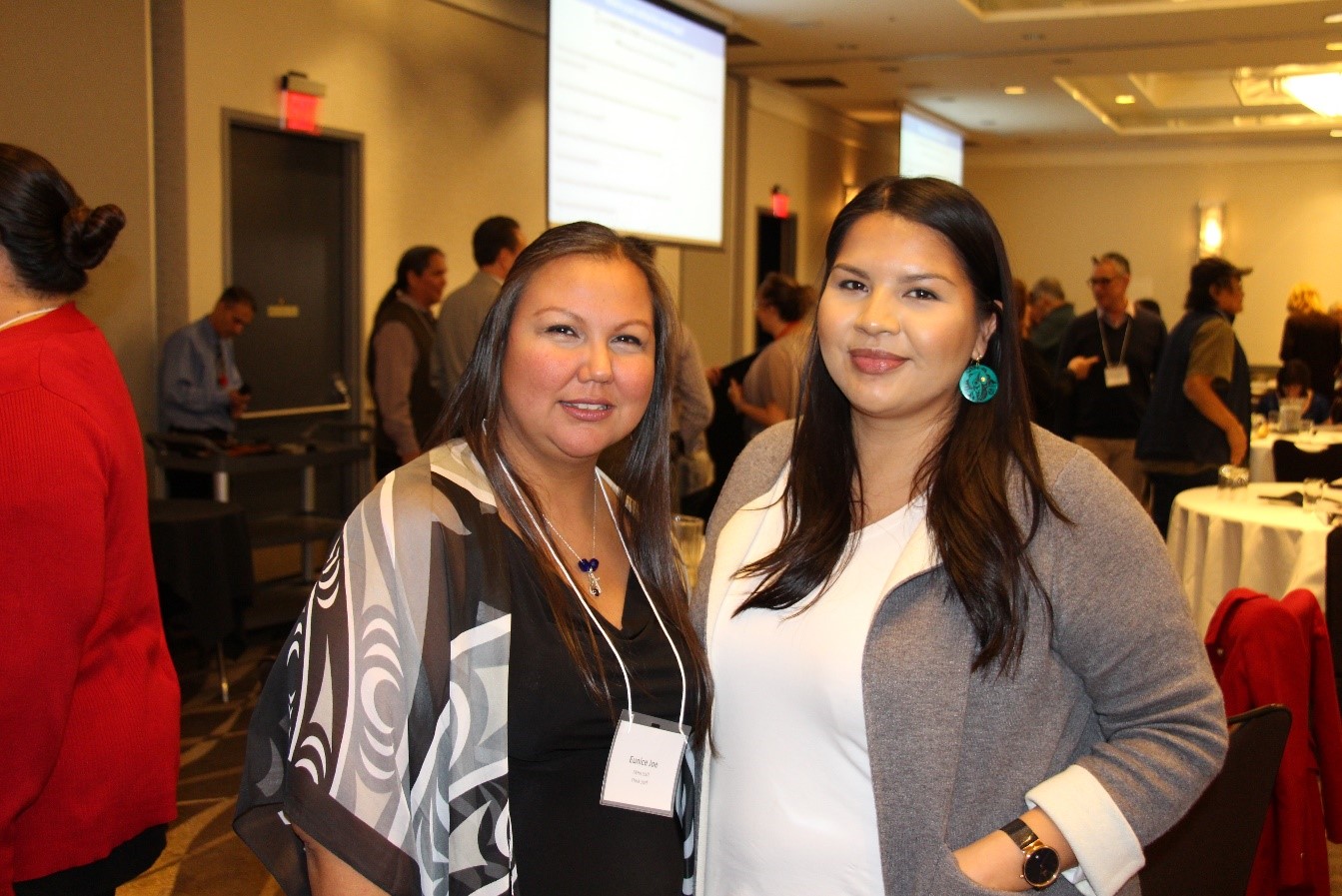
From November 6-9, 2018, leadership from the three Island Families—Kwakwaka'wakw, Nuu-chah-nulth and Coast Salish—gathered in Snuneymuxw Territory (Nanaimo, BC) for Vancouver Island Fall Regional Caucus to discuss the continued improvement of health care for their people. This year's caucus had a strong turnout, with 10 Chiefs, 25 Proxies, 31 Health Directors/Health Leads and 7 Social Leads attending.
Island Families were welcomed by Regional FNHC and FNHDA representatives, including new members. They brought a fresh perspective and voice to the room, and supported productive conversations across the three days.
Welcome to the Territory
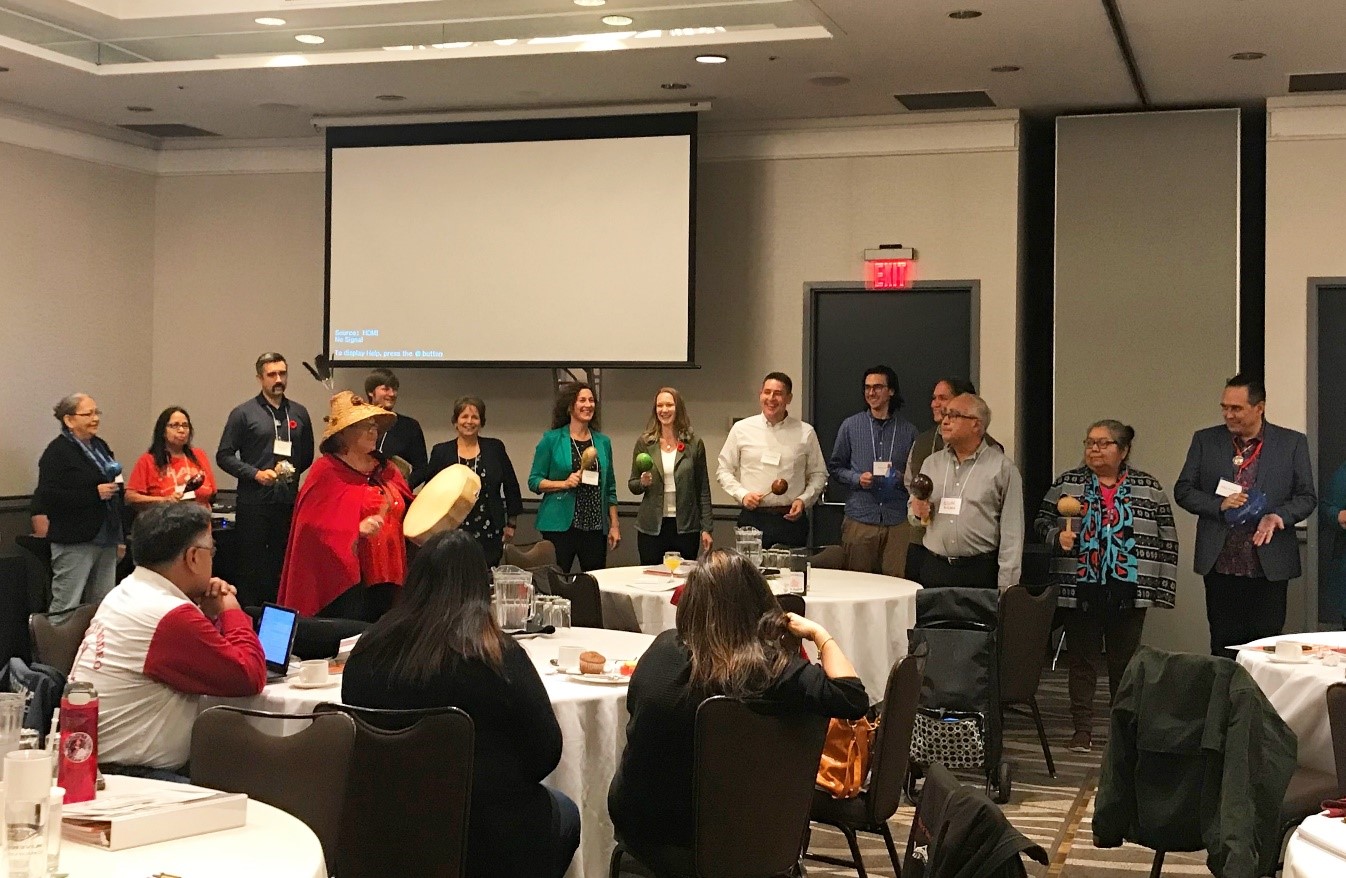
Day one opened in song, lifting spirits and grounding the work in the shared vision of healthy, self-determining and vibrant BC First Nations. Elder Lorraine Good welcomed delegates to the Snuneymuxw Territory, and invited delegates to the front of the room with her to sing. She gave each singer a rattle and taught them the words, explaining that the song meant "good day" in her language. The whole room stood to sing along with the group, cheering them on and wishing "good days" for the work ahead. Paul Sam, Coast Salish representative for the FNHC, also provided opening words.
Vancouver Island Corner Post Bill Cranmer ('Namgis) was then invited to speak. He thanked the Snuneymuxw people, and sang a prayer song to the Creator to bring leaders the "wisdom to do the work that needs to be done for our people," and to "ask that we always keep the communication open and listen to each other." Those words echoed throughout the three days, as the importance of communication became a key theme.
Data and Evaluation
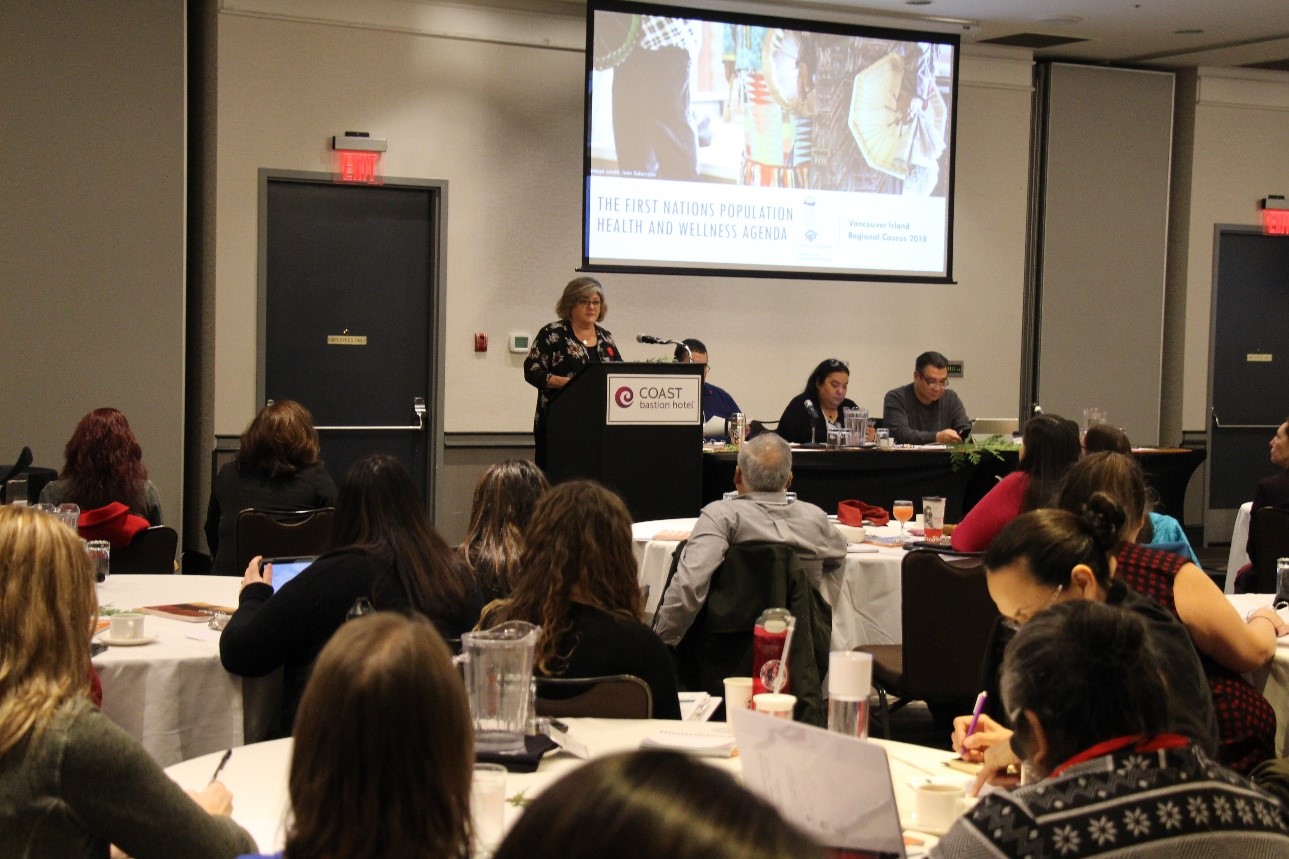
FNHC representative Tania Dick (Dzawada'enuxw First Nation) facilitated the rest of day one, which focused on health services.
Three FNHA presentations shared new data related to First Nations in BC. Dr. Shannon McDonald, Deputy Chief Medical Officer, provided a report-back on the 10-year First Nations population health and wellness indicators; Namaste Marsden, Director of Research, presented the findings of the 2015-2017 Regional Health Survey; and Laurel Lemchuk-Favel, Director, Health Economics and Analytics, and Kari Wuttunee, Regional Manager, Primary Care, shared an overview of the primary care data from the Health System Matrix Data Report.
Dr. McDonald noted that the purpose of the 15 strengths-based health and wellness indicators is to move away from a sickness model and towards First Nations perspectives on wellness.
"First Nations have often been defined by deficit, by what's wrong with our populations. And very rarely has it reflected the voice of the Nations and how resilient the Nations are," she shared. "Our people have survived over time and developed ways of care-giving and health-giving to our families and Nations that are often not reflected in government statistics. So this agenda and set of indicators were making a deliberate shift away from that narrative and towards an approach that promotes and builds on strengths and acknowledges the structures and environments that support us and help us to grow."
Health Benefits Transition, Phase Two
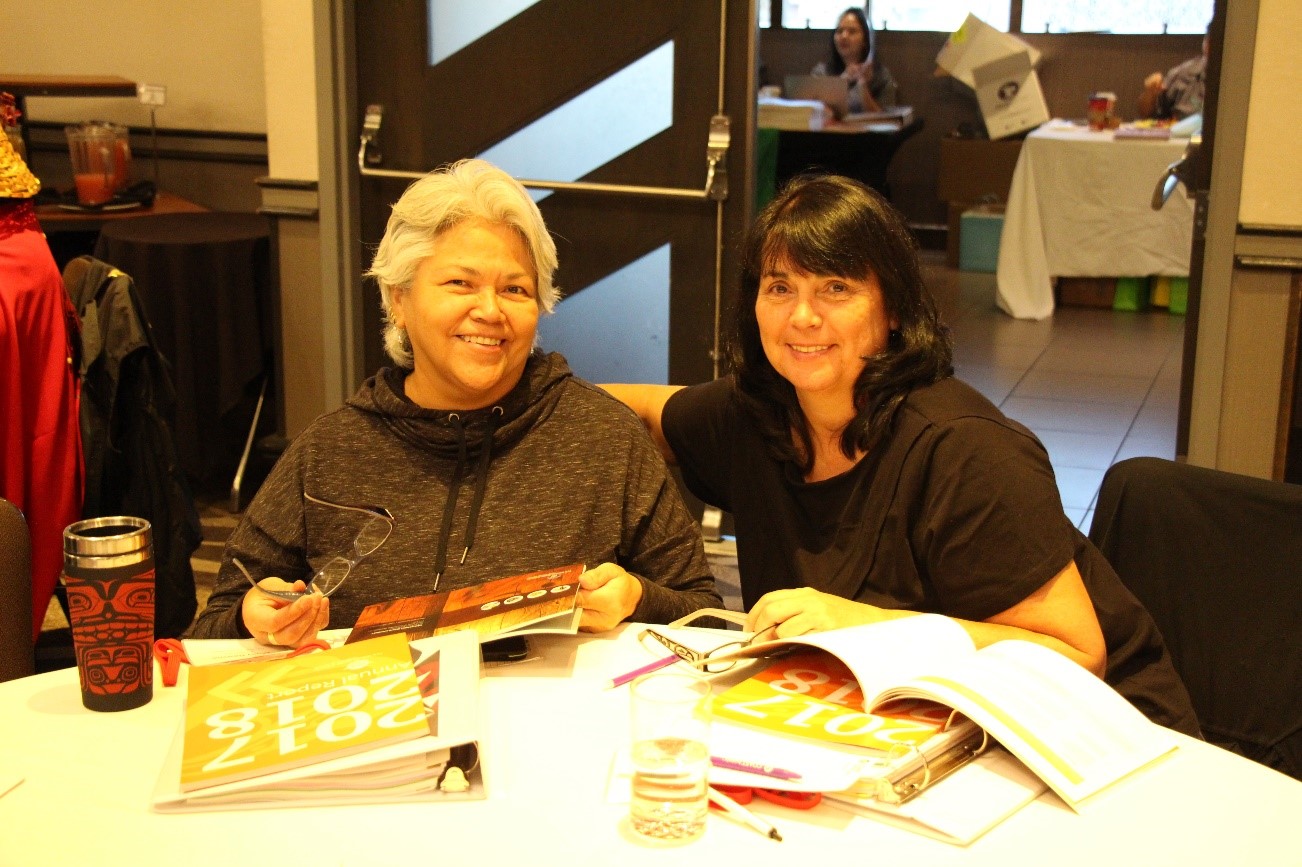
Darren McKnight, FNHA Director of Health Benefits Management, and Vanessa Charlong, FNHDA Nuu-chah-nulth representative, facilitated a discussion on Phase Two of the Health Benefits transition of vision, dental, and medical travel and equipment.
Vanessa emphasized that the FNHDA and FNHC is partnering with FNHA on the second phase to ensure that community concerns and perspectives were being heard "loud and clear." By bringing decision-making closer to home, Darren noted, First Nations can have greater impact on the health benefits policies that affect them.
A thoughtful conversation followed in which leaders shared their views regarding the transition. Island Families expressed appreciation for the improved engagement process and for seeking community feedback earlier. There was agreement that the processes needed to be further streamlined, and that providers needed better education.
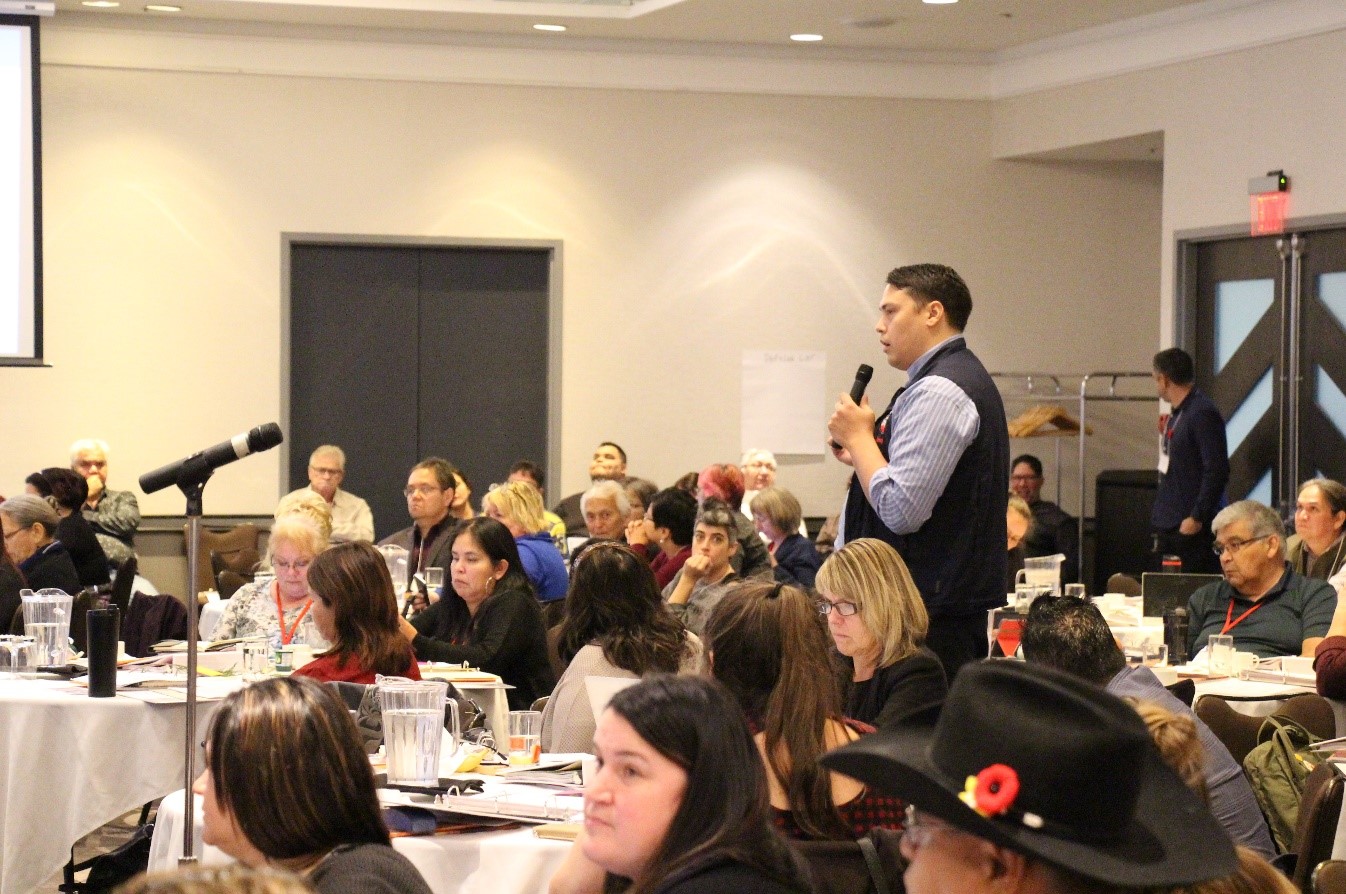
Areas of focus identified by the room included hearing aids, denture care and medical travel for remote communities, with many leaders sharing personal stories related to these issues. The Health Benefits fee structure was also noted as a barrier, with leaders sharing stories of their community members being turned away by dental providers.
Overall, leaders agreed that the unique needs of communities and their members need to be acknowledged and respected, and that the new engagement process will help support more in-depth conversations. As Kelly Sport (Ditidaht Nation Proxy) stated, "We all have one thing in common; we all have distinct personalities and concerns."
Community-Based Solutions to Mental Health
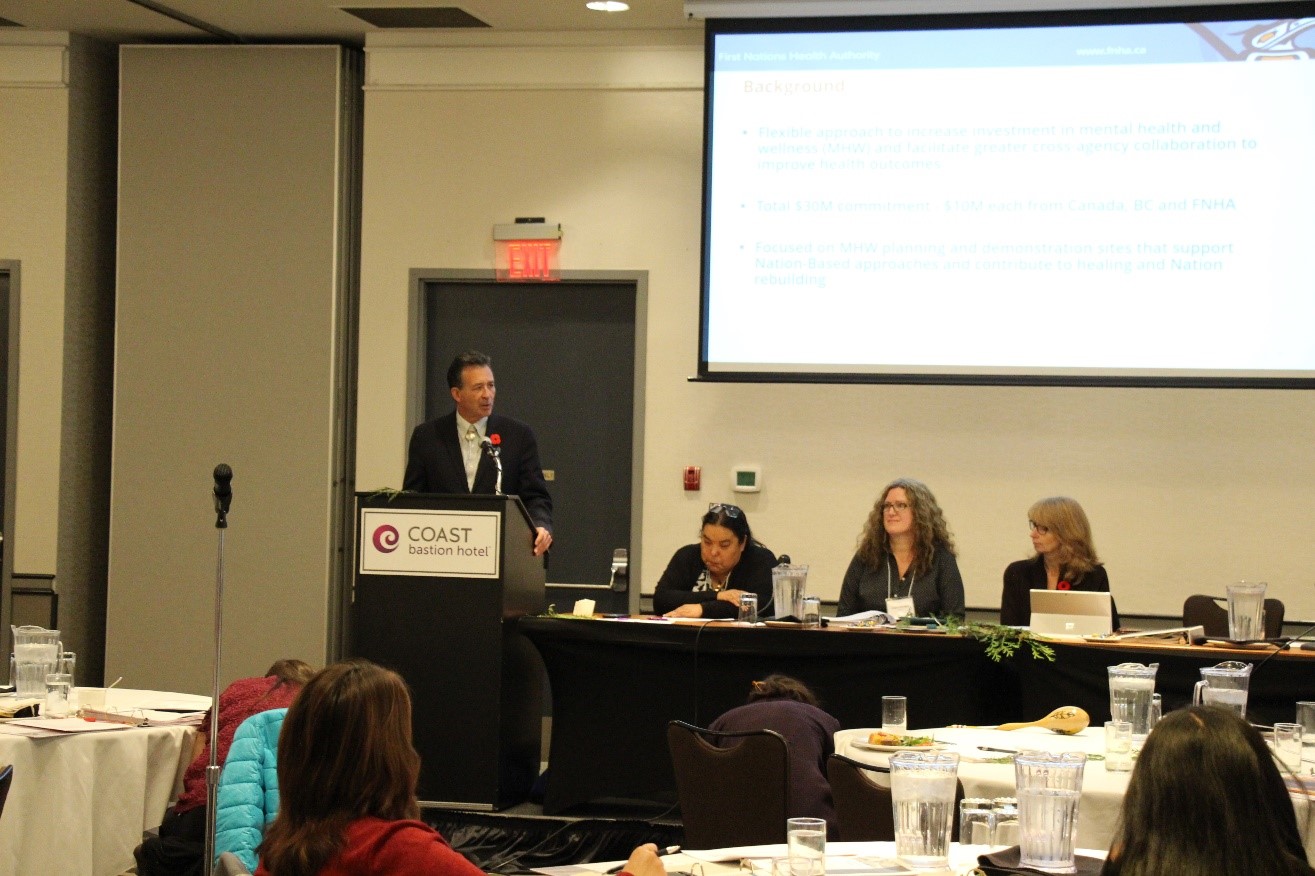
A panel from FNHA, including Richard Jock, Chief Operating Officer, Katie Hughes, Executive Director, Mental Health and Wellness, and Diana Morgan, Director, Operational Relationships and Projects, presented on the recent Memorandum of Understanding (MoU) on Mental Health and Wellness, recently finalized with the FNHC and governments of Canada and BC. Nick Grant, Ass. Dep. Minister of Strategic Policy and Planning also presented on behalf of BC.
The panel shared details of the flexible funding approach and the four-part model aimed at supporting communities where they are at in their mental health and wellness planning.
Community leaders had questions regarding clarity around some of the processes and terms. Most importantly, leaders wanted assurances that funds would be distributed in an equitable manner. FNHDA Board member Charles Nelson pointed out that some communities' "health staff" include only a Health Director and that the administrative burden of applying and planning for these programs is much heavier for these communities. Richard Jock communicated to delegates that these situations are being considered, and that assessments will be needs-based.
The overdose crisis, and its connections to mental wellness, were also discussed by Island leadership. Brennan MacDonald, Executive Director, Vancouver Island Region, presented alongside FNHA's Courtney Defriends and Island Health's Tara Fitzgerald on their ongoing efforts.
Courtney emphasized that although death from overdose is a primary concern, the opioid crisis is wide-reaching and can include broader substance use concerns, which will be different for each community.
The conversation that followed was heartfelt and personal, with many leaders sharing how the crisis impacts their communities and families. One powerful story, that was mentioned often throughout the three days following, came from a leader who shared that his communities' social gatherings had become funerals, due to the impacts of the crisis.
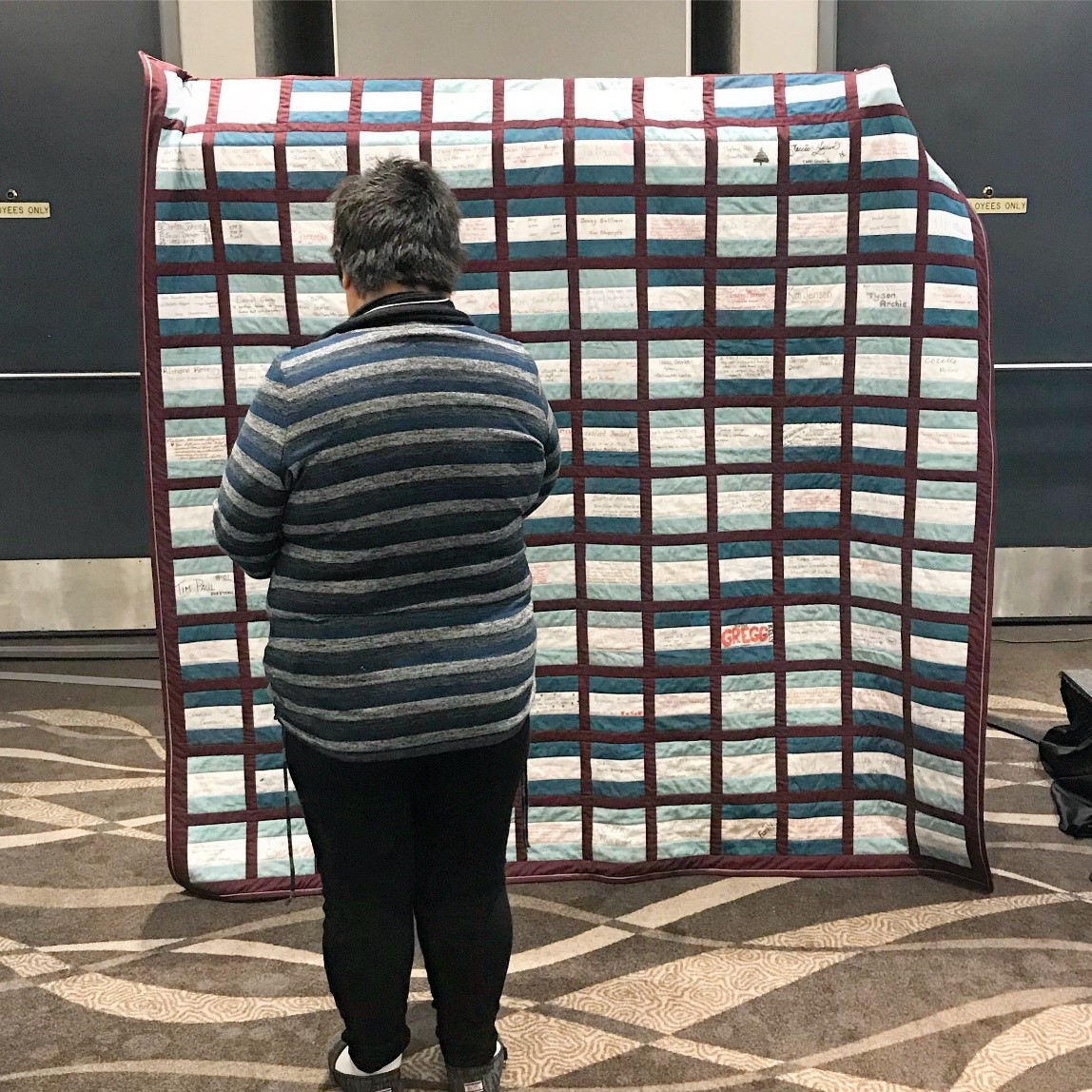
At the end of the discussion, the quilt created during Gathering Wisdom IX to honour the fallen warriors lost to the overdose crisis was shared and hung. The quilt shares messages from loved ones written on its panels, and will travel to all five caucuses.The conversation on mental health and wellness, and the MoU, continued from a governance perspective on day two, including Family-based breakout sessions for pre-planning.
Where We Came From, Where We Are and Where We're Going
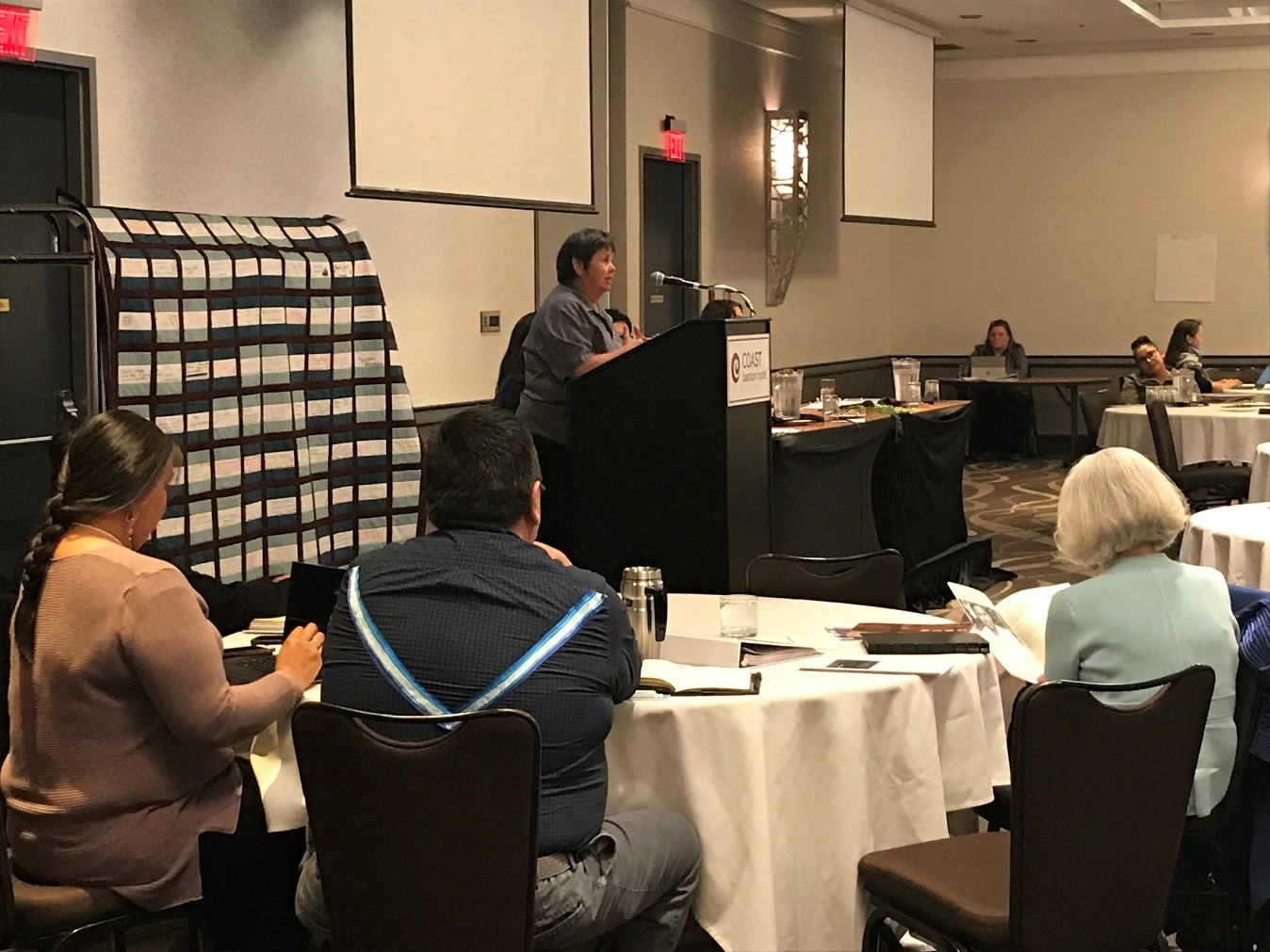
Cliff Atleo, Wickaninnish (Ahousaht), led a prayer to open day two. He shared introductory remarks on process, how to work together in partnership and the importance of communication, echoing Bill Cranmer's message from the first day.
"Understand that we can do better as a collective," he said. "Understand that our role is monumental given the environment and circumstances that many of us grew up with, not our choice, but we're on a good path."
FNHC Deputy Chair Allan Louis (Okanagan Indian Band) facilitated the rest of the day.
A panel presentation was held on the Past, Present and Future of Mental Health and Wellness Planning. Mary Knox, Manager, Island Health, and Marina White, FNHA Community Engagement Coordinator, presented on First Nations House of Healing, a culture-based healing centre that ran until March 2014 with innovative programming.
Next, Anita Charleson-Touchie, a family therapist, led one of the most impactful conversations of the day on the work of Kackaamin Family Development Centre in Port Alberni.
Anita spoke on the organization's mandate to share how First Nations people had healthy, culture-based ways of living and healing, pre-contact. She shared that the program helps individuals piece together their life stories, which she described as being like disconnected puzzle pieces. "We strive to help families put those pieces of the puzzle together."
Leadership in the room received the presentation warmly, noting in particular the focus on holistic care and cultural support. The group discussed the need for greater support for sexual abuse survivors, offenders and their families as well as education for those who are supporting survivors. There was also meaningful discussion around alcohol misuse and the barriers to receiving treatment.
Honouring Simon Read
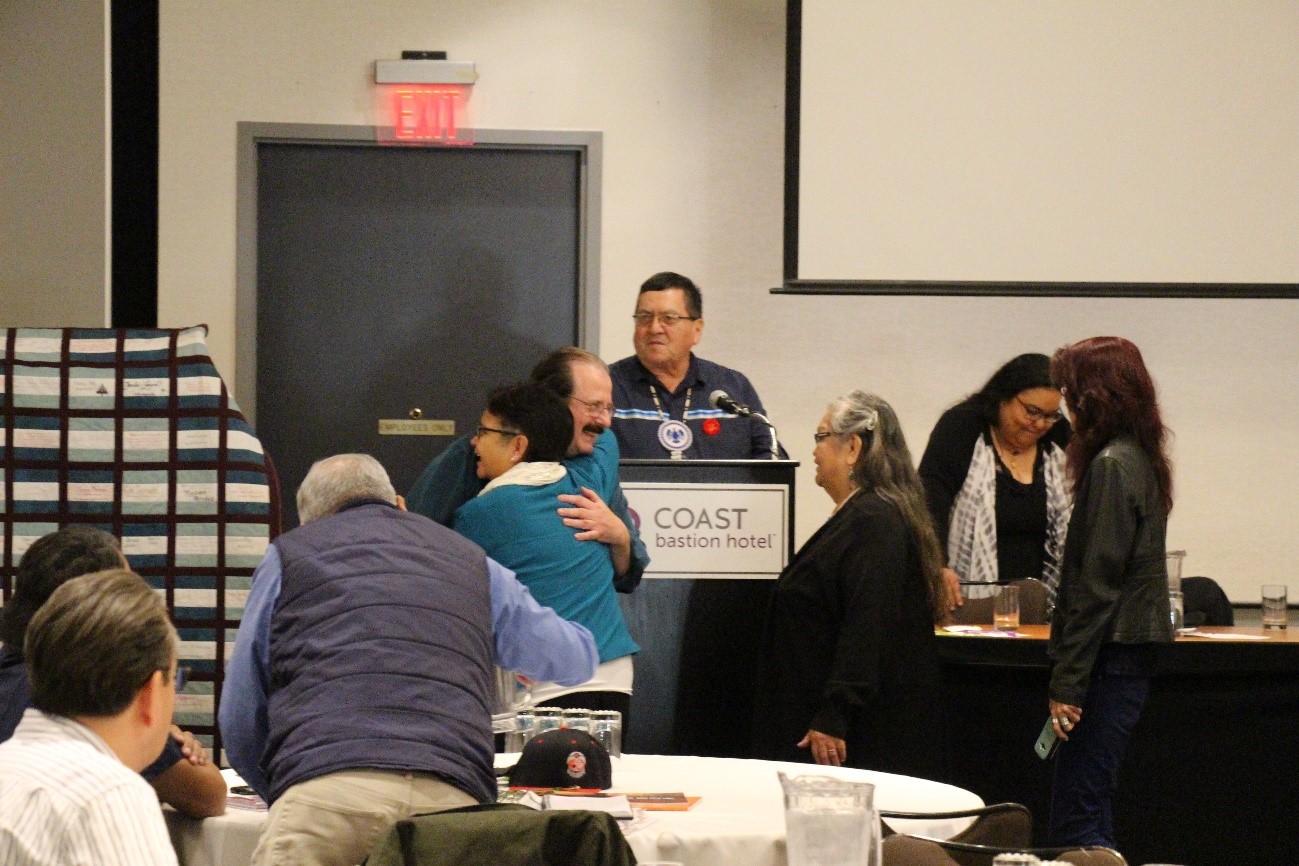
That afternoon, Island Families, led by Paul Sam, honoured Simon Read for his decades of work as Health Director for Nuu-chah-nulth Tribal Council (NTC), as he nears retirement. Leaders, including Tania Dick, Cliff Atleo, Andy Callicum (Vice President, NTC) and others, recognized his achievements and thanked him for his service.
"Just want to say thank you so much, Simon, for the all of the years that you've brought to the Nuu-chah-nulth people," shared Tania Dick. "As a health professional myself, as a nurse practitioner, I was able to work in your program. The program itself contributed a lot to my profession and how I felt about going forward with things. And I know that program is looked on throughout the province and across the country through the nursing lens as something that's quite significant […] So thank you very much for being very impactful on the delivery of service and for the people themselves in community."
Leadership Orientation Dinner
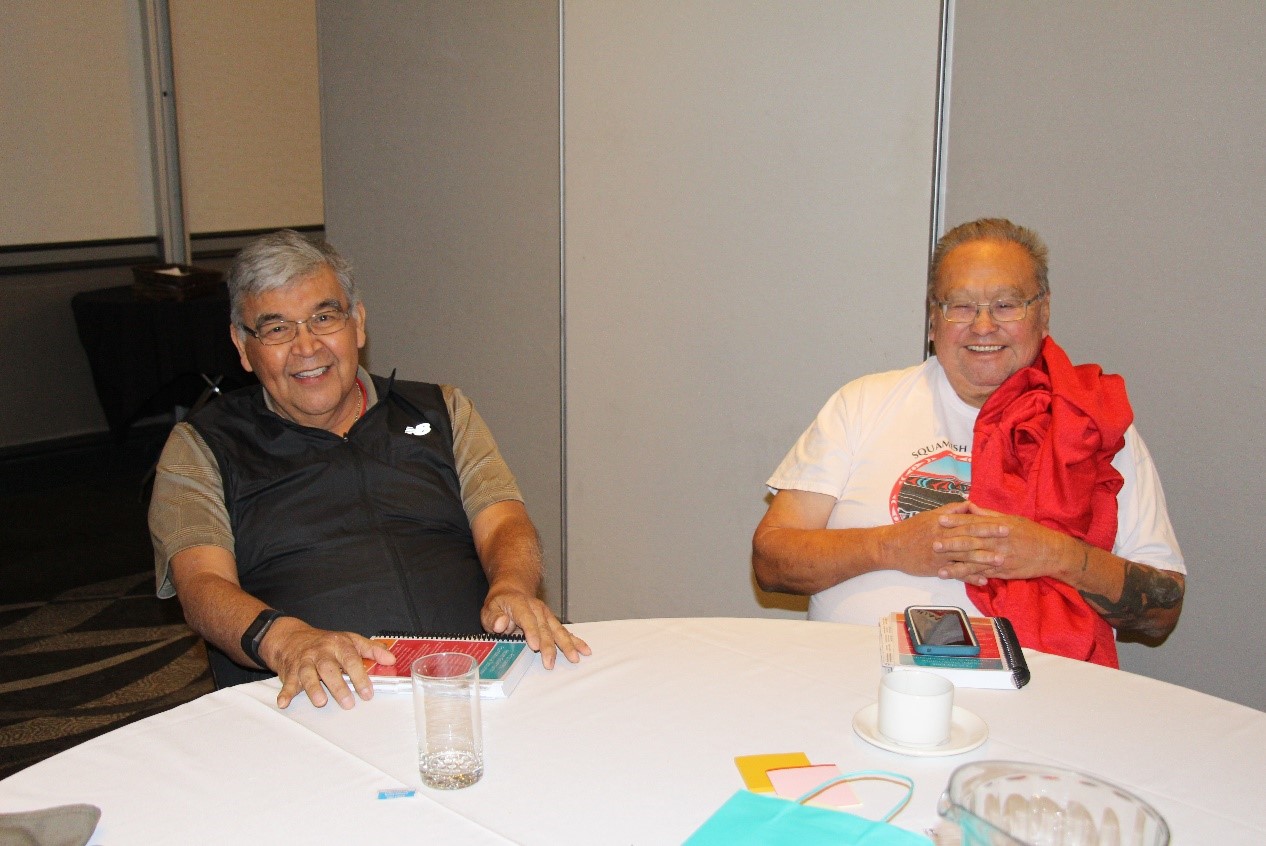
The FNHC hosted a leadership orientation dinner on the evening of day two to support leaders in their understanding and knowledge of the BC First Nations health governance system.
A new orientation video was launched during the dinner, featuring current and previous members of the Health Council, including Grand Chief Doug Kelly (Chair and Fraser Salish representative) and Charlene Belleau (Interior representative) as well as FNHA executives. The video touched on Nation-building, the history of the health transfer and key partnerships and agreements. The video was well-received, with some leaders mentioning that they wished it existed when they started their work.
Day Three: Technical Health Leadership
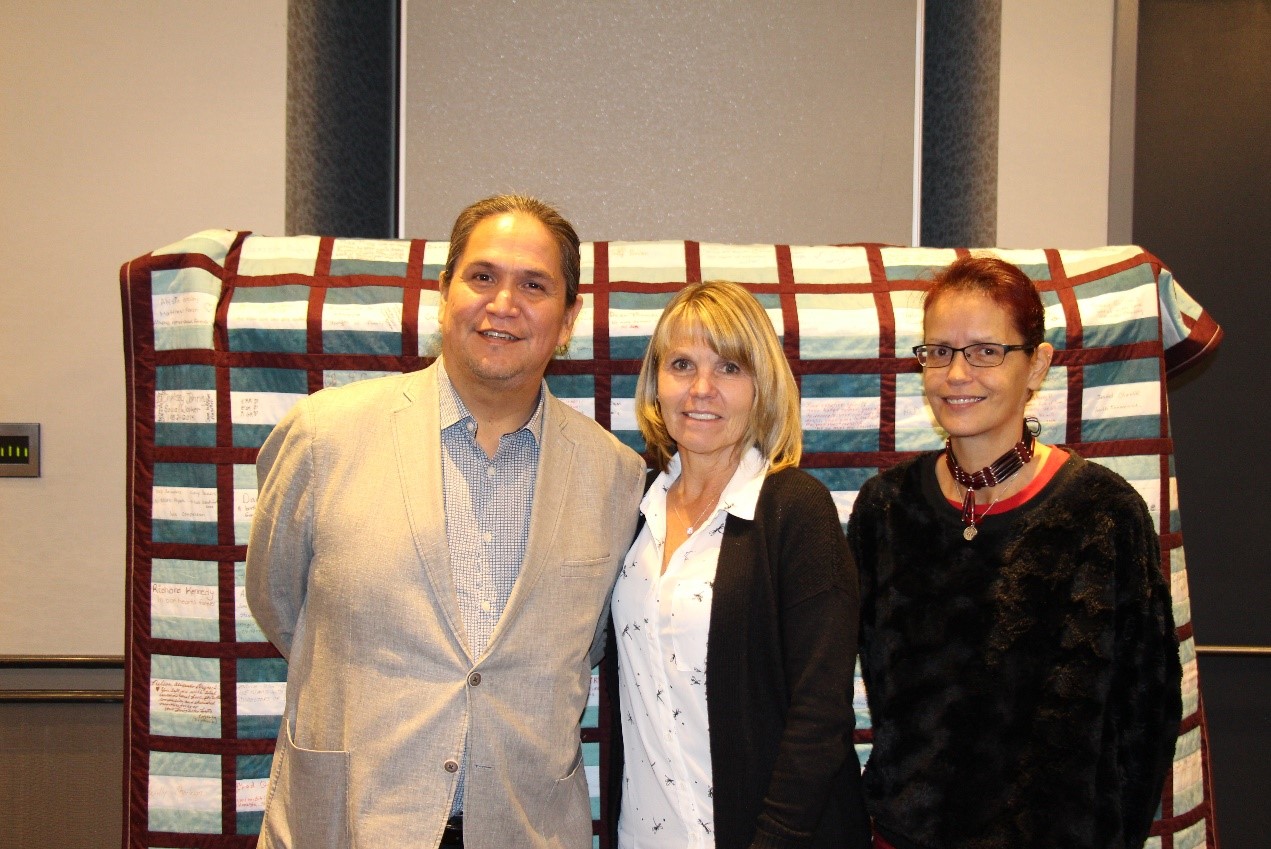
Day three was hosted by the FNHDA Island representatives Kim Roberts (Kwakwaka'wakw), Charles Nelson (Coast Salish) and Vanessa Charlong (Nuu-chah-nulth), and included presentations on various aspects of health and wellness planning and partnerships with service providers.
The day ended with a robust discussion of Cannabis legalization and what it means for Island Families. George Kitchen of Health Canada and Diana Moffat of the Province of BC presented on public health approaches and regulation, and Dr. Nel Wieman, FNHA Sr. Medical Officer, presented on FNHA's approach to harm reduction and mental health and wellness. Community leaders had many questions for the panel regarding regulations, how those apply in First Nations communities, and the public health risks for their populations.
The last day of caucus was closed out by Corner Post Bill Cranmer, who asked the Creator to watch over delegates as they journeyed home, ending a fruitful and deeply felt three days.
Agenda of Presenters
Day 1:
| Opening Comments: Vancouver Island Region Corner Post | Bill Cranmer |
| Health and Wellness Indicators & Regional Health Survey Update | Dr. Shannon McDonald and Namaste Marsden |
| Primary Care & Health System Matrix Data Report | Laurel Lemchuk-Favel and Kari Wuttunee |
| Partnership Accord Steering Committee Evaluation & Survey Introduction | Eunice Joe and Megan Misovic |
| FNHA Health Benefits Discussion: Transition of Dental, Vision, Medical Supplies & Equipment Benefits | Darren McKnight and Vanessa Charlong |
| Mental Health MOU Funding Implementation | Richard Jock, Katie Hughes, Nick Grant and Diana Morgan |
| Vancouver Island Opioid Response | Brennan MacDonald, Courtney Defriend and Tara Fitzgerald |
| FNHA Board Report | Colleen Erickson and Jason Calla |
Day 2:
| Overview of Agenda and Introduction | FNHC Representatives |
| FNHC Update | Allan Louis |
| Panel Presentation: Past, Present & Future of Mental Health & Wellness Planning | Mary Knox, Marina White and Anita Charleson–Touchie |
| Orientation to Regional Structure & Process | Eunice Joe |
Day 3:
| BC Emergency Health Services | Blaine Wiggins and John Mah |
| Health and Wellness Planning: A Toolkit for BC First Nations | Annie Merritt |
| Community Health Planning Wise Practices and Training | Kim Roberts |
| Cannabis Engagement Panel Presentation | Dr. Nel Wieman, George Kitchen and Diana Moffat |
| Provincial Health Services Authority: Correctional Health Services | Richard Singleton |
| Wildcat Helicopters | Matthew Louie |
| Closing Remarks | Bill Cranmer, FNHDA Representatives and FNHC Representatives |

